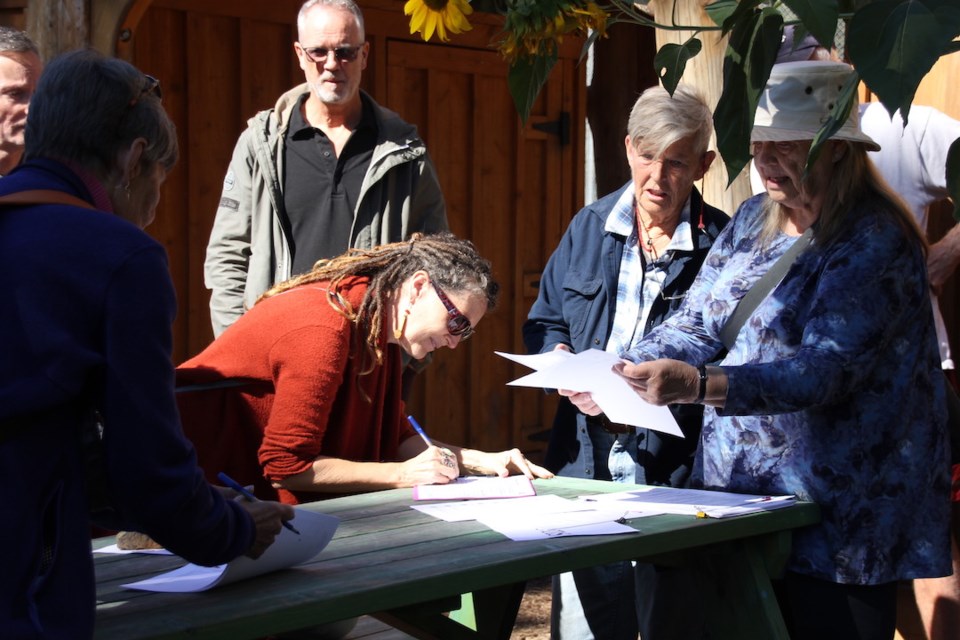After the last year and a half alone brought wildfires, atmospheric rivers, floods and landslides and repeated heat waves to many communities in B.C., a group on the Sunshine Coast is calling on residents to join the Sue Big Oil class action lawsuit targeting the world’s largest oil companies.
“It’s time that we make the polluter pay,” Fiona Koza, a climate accountability strategist with West Coast Environmental Law said, receiving a rousing applause in response.
More than 60 people, including at least 10 local election candidates, gathered in-person at the Legacy Garden in Roberts Creek on Sept. 18 for the campaign’s official local launch. The event was also live-streamed online by the Sunshine Coast Climate Action Network.
The local launch of the campaign comes after the City of Vancouver voted 6-5 to join the lawsuit in July, and set aside at least $1 per resident. (Koza says the Sue Big Oil group also plans to do crowdfunding and seek private donations and grants.) Attendees were asked to help convince local governments to make a similar commitment, sign and share the petition, and share information from the Sunshine Coast-specific campaign website www.scsbo.ca. They were also encouraged to approach local election candidates, vote in the upcoming Oct. 15 election, and approach councils as delegates after the election.
Between the soft launch in Gibsons on Sept. 5 and the official launch in Roberts Creek, 85 people signed the Sunshine Coast petition in person, and more have likely signed online.
Candace Campo, a shíshálh Nation member whose ancestral name is xets’emíts’á, welcomed attendees, shared a brief history of the land, and asked everyone to take care of the land. She spoke of the impact of climate change on people of colour, Indigenous communities and their ways of life.
“I sometimes have to not just wear my hat as an educator, but to step forward and wear my hat as a spokesperson, as an advocate for the environment. I share with you that within our society within a human being, there are four spheres that we have capacity as human beings. There's teacher, leader, healer, and warrior. Warrior is the advocate that steps forward, that steps up for other people in their time of need.”
“I have to say the past year and a half, I think, was a real wake up call for people across British Columbia. I know living in the Lower Mainland. living through the heat dome, it was quite traumatic,” Koza said.
Koza is a climate accountability strategist with West Coast Environmental Law and working on the Sue Big Oil campaign. At the Roberts Creek event, Koza said local governments — and taxpayers — are the ones that bear the costs of climate impacts, such as infrastructure damage. She said although local governments advocated at the recent Union of British Columbia Municipalities conference for the provincial government to help pay for climate costs, the taxpayers ultimately still pay.
“So suing big oil not only helps the communities pay for the skyrocketing costs, it's also going to ensure that oil companies are held accountable and paying their true costs,” Koza said. She added that, cumulatively, local governments should be spending around $5.3 billion every year to protect from climate change, according to the Insurance Bureau of Canada.
This civil action lawsuit would be the first of its kind in Canada, Koza said, but follows around 20 similar suits filed in the U.S. and more than 2,000 climate litigation cases in the world. Sue Big Oil is being filed in B.C. in particular because if they lose, they do not have to pay the other side’s legal costs, unlike in other provinces in Canada.
“For anybody who's wondering whether this is a realistic approach to take, I encourage you think back to the lawsuits against big tobacco. They similarly spread misinformation, undermined the science and policy while continuing to profit from the sale of the products that they knew for years were causing this harm. These successful lawsuits against them helped change that industry. And we're going to do the same thing to big oil,” she said.
During a question period, Koza was asked whether the lawsuit is for specific events and mitigation or broader climate impacts. She said it will be up to the local government to determine the terms of the lawsuit, but the group proposes it includes climate damage, preparedness and adaptation.
Avi Lewis of UBC Centre for Climate Justice (and a resident of Halfmoon Bay) stepped up to describe the local organizing team as having “gone further and faster in a more sophisticated and thoughtful organizing strategy than anyone in British Columbia.”
As he pointed to recurring local water supply issues and international climate events, Lewis said, “We’re living in an unfolding emergency. And the question is: What are we doing?...What can we do?” His suggestion is to influence social, political and cultural tipping points to change the status quo and “start acting like it’s an emergency.”
“We are living in infrastructure at every level that was designed for a climate that no longer exists. We have to rethink everything. Those costs are going to be in the untold billions of dollars. We have to go and get that money. We have to sue big oil,” he said to applause.
A Sept. 27 webinar will train Sue Big Oil supporters about how to engage with election candidates about climate change and the campaign. Alliance4Democracy is also hosting a series of climate-focused all-candidates meetings on Sept. 27, 28 and 29.




